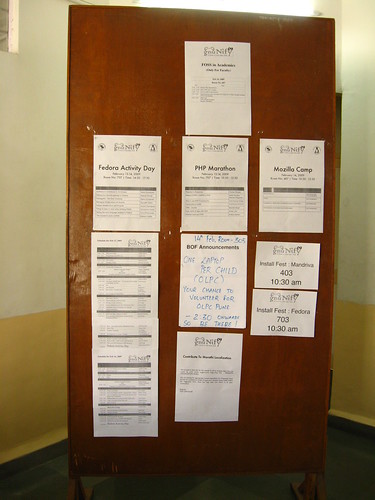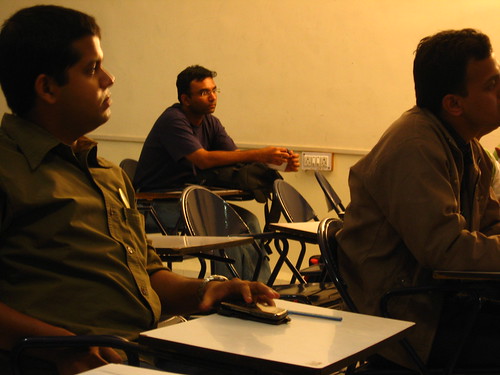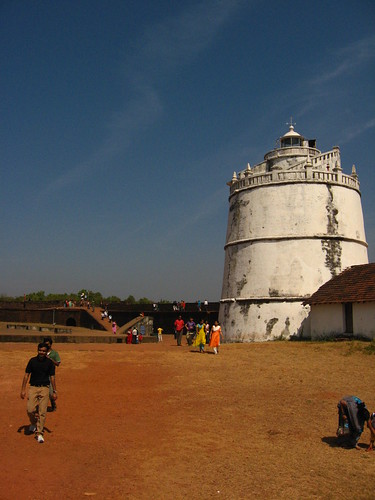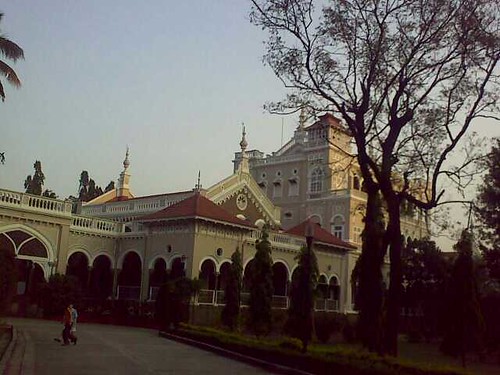GNUnify09, organized jointly by SICSR and PLUG was held on the 13th and 14th of February 2009 at the SICSR Campus. The schedule had 2 half days of Fedora Activity Day(s) and, this is intended to be the report.
Day01
Reached the venue early, primarily to catch up with Susmit on the current plans and conspire a bit about the activities to be planned in the coming year (the financial year for Fedora starts from March onwards). Susmit was looking fresh as usual and over breakfast was a quick run-down of issues, events and plans. Thereon, the group (myself, Runa, Rakesh and Susmit) proceeded to the Speaker’s Lounge, where Rakesh promptly dozed off. The introductions got going and soon we were meeting folks from the Twincling Technology Foundation (Saifi and Namita) along with a couple of students from the institute who on and off do Fedora stuff. Susmit took a couple of moments to survey the room to check for infrastructure, coaxed the organizers to put up a few banners and posters on the boards and, laid out a bit of swag. I goaded the @fedoraindia twitter to come to life with a few tweets while waiting for the usual buzz to die down a bit as the event swung into action. Multiple halls across multiple floors started off with the talks and a couple of them looked promising enough to attend. Ramakrishna and Rahul text message about coming post-lunch and things were looking good. The regular photographer (aka paparazzi) at the event, Vijay swings by the speaker’s lounge to try and take a few candid shots of Vivek Khurana making faces at his laptop.
Since the FAD was not starting before 1430, a couple of us went into various talks particularly one on OSM which had a small but curious group of students talking about GPS devices and thinking up usage models of the OSM data. At around this point the OLPC India BoF notice was also put up (unfortunately clashing with the FAD schedule for the next day). Meet Pradeepto and Ajay Kumar (Sahana).
Post lunch with the arrival of the speakers, the FAD started off. The crowd started trickling in. Primarily because a round of the round-the-clock Fedora install fest that was happening in the next room got over. Rahul kicked off the FAD with his “User -> Contributor in 15 minutes” talk. Themed around the join.fedoraproject.org page, Rahul talked about the ways and means to collaborate in a project, the simple acts of filing bug reports. Questions start popping out and, the FAD is truly underway. Taking cue from a few of the questions, he pitches Art, Documentation and FEL. Joy. The Q+A session becomes collaborative with all the Fedora India folks chipping in to answer queries. Pradeepto goes to his KDE Talk and meanwhile talks with Rahul about the KDE LiveCD in F10 and whether it would solve some of the issues that he had faced while using KDE on F9. He promises to download, install and provide feedback.
Rakesh Pandit takes over from there with his ‘getting your favorite application into Fedora’ talk. Essentially about Packaging, the aim was to demonstrate the simplicity involved in the process and Rakesh took time to run the audience through the processes, necessary reading all the time using examples and on-screen explorations. Nicely packaged talk that took in questions during the talk and, had ample examples of real-life thanks to Rakesh being an avid packager himself.
More folks troop in and up goes Ramakrishna with his series of 4 lightning talks on “Things to know when you want to do FOSS”. A basic run down of list items that one needs to know, he tossed out cheat-sheets by the boatload. As he began, “Life is bad, Times are hard …” with the state of placements of students as they are, the theme sure struck a chord amongst the students. Meanwhile, we start distributing media and, around a 100 odd units fly off the table. More work done by Runa and Susmit in putting the media into jacket sleeves. More media put out, they fly off as well.
Susmit takes on the hard task of pulling together the last talk of the day “mirror-in-a-box”. Relates well to the crowd with his problems and solutions slide deck and the quick demo. More questions and answers and doh !! half day of FAD is over. A tentative schedule for Day02 is announced, the crowd thanked for attending, the mailing lists and IRC channels are repeated again. And, we troop off to the ‘poolside dinner’ organized at SIMS.
More talk and idle gossip at the dinner while waiting for the finger-food to land up at the massively ‘merged’ table that Pradeepto and Ajay created. Karunakar rummages through Ramakrishna’s bag to fish out the camera and starts clicking away. As is the norm, the recent [OT] stuff from various mailing lists come up along with the by-now-familiar lament about the increase in the ‘i want 2 do project’ mails. Having Shakthi around makes for good fun as he shares some of the gossip and chats.
Pradeepto comes back home with me and Runa and, we chat away till wee hours about randomly mundane stuff. Friday the 13th rolls over into Saturday the 14th.
Day02
Slight panic. Turns out that the ‘Genome’ talk by Saurabh Bathe might not happen. Saurabh is busy attending to his day job since he went on-call. Thankfully, we have a surprise speaker up and he is more than willing to make up for the speaker lost. More on that later.
We reach the venue early, hand over the media for the Academics Track to Manjusha, take a peep into the install fest. The immediately visible aspect is that the crowd is considerably lesser than Day01, whether 14th of February was the root cause remains to be found out. More plans with Susmit about the Fedora Ambassadors in India and, their roles and responsibilities. Some good points come up about mentoring the new Ambassadors and making them slip into their roles comfortable. ToDo items around IRC classrooms come up. More media packaged, around 100 more fly out. Stickers are being passed around. The Mozilla Camp during the first half sucks in a large part of the student crowd eager to see the “Bespin” demo and other stuff.
Post lunch the FAD begins in sync with the end of an install-fest round. Rahul begins with his “Spin” talk and demonstrates how to create a LXDE spin along with taking in requests from the crowd to show about creating other spins as well. Kashyap Chamarthy takes it up to talk about PKI. Speaking to a nearly full house he runs the audience down through the background of PKI, relates it to the curriculum, talks about theory and practice, provides real life examples and deployments and in general makes it a well rounded talk that is worth repeating at a couple of colleges and technical workshops. Wonderful work from him to show up and chip in when we realize that Genome isn’t happening. We do the wrap-up session with the usual pointers to the Fedora India community, talk a little bit about projects/internships and, there we are. FAD is over.
Somewhere in between I sneak into the OLPC BoF being organized by Amit Gogna. Good ideas are flowing and there is a nascent OLPC Pune group already being formed and a get-together camp organized on March01.
Little bits of talking with the organizers, we troop back to our house for what is now-called the ‘Konqueror Party’. The K-man said that pizza was his food of choice and so, pizza it was that we ordered and gorged on while talking about the usual banal stuff that comes up when friends meet.
Important lesson from the FAD(s) –
- if we are facing a student crowd, it is always better to have handouts prepared for specific projects that they can take back. As of right now, I am not too confident about the hand-written notes that they jotted down.
- putting out the URL for rpmfusion on the board during the install fest is a good idea
- taking time during the install fest to point folks to IRC #fedora-india is a really nice idea
- looking at GNUnify as an user generating event and tweaking the focus would reap us more benefits
- following up GNUnify with a Fedora centric workshop would perhaps be nice
Photographs to be uploaded as soon as I get a decent connection. Some of them are here.






